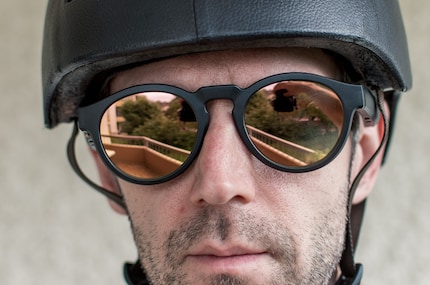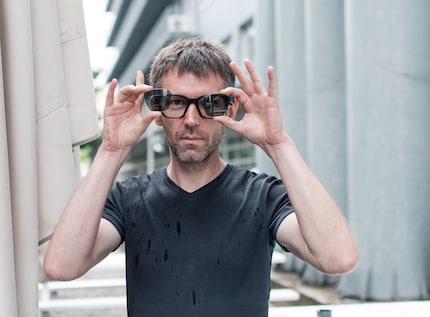
Product test
Nothing Headphone (1) review: a great-sounding fidget toy
by Jan Johannsen

In addition to tried-and-tested, solid audio devices, Bose also regularly brings out new products for the cabinet of curiosities. Tested today: the Bluetooth sunglasses.
Bose Frames are sunglasses with integrated loudspeakers that play sound via Bluetooth. It's like a pair of hearing glasses for people without visual or hearing impairments. The idea: you should be able to listen to music without having to plug your ears with headphones. It's supposed to be more comfortable and you can hear more of your surroundings.
The Bose Frames are available in two versions. The square Alto model is slightly larger than the Rondo model. This one fits my medium-sized skull well, the square one is too big for me.

Both versions come with non-polarised, dark lenses. These can be replaced with polarised lenses or simply with a different colour. The scope of delivery includes a sturdy case, a magnetic charging cable and a user manual, which only contains a note that you need to install the Bose Connect app. There you can find out everything else and the app will generate a random name for you, such as "Prince Ironheart", "The Ripper", "Headdress" or my personal favourite, "Enjoy the silence".

The question I ask myself: What is this thing useful for in everyday life, and what isn't it good for?
The music is clearly audible to other people even at a moderate volume. Even louder than with poorly shielding headphones. I already notice this in the office as the frames go round. That's reason enough for me not to even try the frames on public transport. Especially not on the S-Bahn. You sit close together, the train is quiet and you can hear every noise. Even if people were too polite to show me: I'm sure I'd get on their nerves with the Bose frames.
I often wear sunglasses at the wheel, but never headphones - they're too distracting. And the sound from the car's stereo system is anything but perfect. So this is where the Bose glasses could score points.
But they don't. The engine noise largely drowns out the music; certain frequencies in the upper range remain audible, which sometimes come as a surprise - virtually out of nowhere. The music tracks are barely recognisable. I can't turn up the volume on my glasses, and fiddling with my smartphone while driving is a no-go for me. At least you can skip to the next track by pressing twice.
Also: bad luck, if there's a tunnel, the sunglasses have to go.
The frames are light (45 grams) but bulky. Surprisingly, I can put the glasses on under my bike helmet despite the thick frame. It works because the rearmost part of the frame, where the ears are, is comparatively slim.

This was the only positive surprise on the bike. Passing cars are too loud to hear the music. Although this is less of a problem with uniformly loud songs than with songs with very different volumes. "Let there be rock" by AC/DC always works, "Hallelujah" by Jeff Buckley doesn't work at all.
I thought that hearing the traffic well would at least make me safer. But that's not quite true. The noises sound different to me when I can hear the sound of the frames at the same time. As a result, I can't identify certain things. For example, I can hear that something is making a noise behind me, but I can't hear that it's a car.
I don't have these problems on the sofa. I don't disturb anyone and no one disturbs me. The sound is acceptable, but clearly worse than with mediocre headphones. The bass in particular should have more power. One small advantage: I can lie down on the sofa and lean the back of my head against it. With the big headphones, I'm always bumping into something.
But I don't need sunglasses on the sofa. Besides, I already have a good-sounding stereo system there.
Not surprisingly, the glasses are no good at work. I disturb the others and, conversely, their noise reaches my ears unfiltered. I also can't see anything on the screen with the polarised lenses. Of course, I can replace them with the non-polarised ones supplied. Replacing the lenses is done by brute force and is therefore very easy. But it doesn't really make sense to wear the hearing glasses in the office.
Livia, who is sitting next to me in the office, also briefly tried on and tested the Bose frames. Her long hair changes the sound. Sound that would otherwise radiate in all directions is channelled better. This makes it louder and the bass is stronger than when the hair is behind the ears. What's not so great, however, is that the sound changes to one side when Livia tilts her head.
The weather is changeable today. Do I always have to have two devices with me, headphones for rain and Bose Frames for sunshine? No! If it gets too dark, I can take the lenses out and walk around without them. Casual. But not useful. And it doesn't look particularly intelligent either. What's more, the device is not protected against raindrops. And why should it be? It's a pair of sunglasses.

I can also make phone calls with my hearing glasses. Because the Wizards of Bose have also conjured up a microphone in the frame. However, telephone test rabbit Livia confirms that she can hear everything but my voice. To make myself understood, I have the following options: 1. shouting. 2. take off my glasses and hold them in front of my mouth while speaking. 3. form a sound channel from my mouth to the frame of my glasses with my hands
.
Replaceable lenses, sturdy case, light weight, usable operation despite only one button: the implementation of the Bose Frames is not bad. But the idea. There is a reason why we are still using headphones in 2019. Even more than ever. Headphones are better in practically all situations. The problem of certain models blocking out too much of the environment has already been solved - including by Bose itself. I could only use the Bose Frames as a not entirely serious gadget - but they are clearly too expensive for that.
My interest in IT and writing landed me in tech journalism early on (2000). I want to know how we can use technology without being used. Outside of the office, I’m a keen musician who makes up for lacking talent with excessive enthusiasm.

Product test
by Jan Johannsen

Product test
by Jan Johannsen

Product test
by Siri Schubert